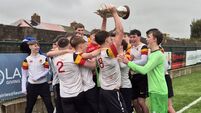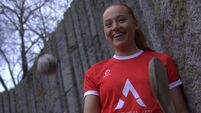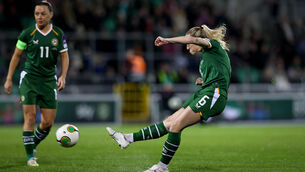Sandy Fitzgibbon v Denis Irwin: Vote for your favourite Rebel Legend

Vote for your favourite Rebel Legends each day.
SANDY Fitzgibbon or Denis Irwin?
is running a fun contest until March 11 where you can vote for your favourite Cork stars since 1970 and pick who progresses in each round until we're left with an overall Rebel Legend winner.
We started with 32 contenders and are now into the last 16, with another tough choice for you to make. This poll will be open until 8am on Sunday morning.
Here's the case for each of the Leeside stars and keep checking here for updates on the winners in each round
The busiest week of her career came in October 1990.

IN his second autobiography, Sir Alex Ferguson reflected on the great players he had managed and how he might compile a best 11, but there was one name he was sure of...
“Honestly, I would say Denis Irwin would be the one certainty to get in the team,” he said, “I called him an eight out of 10.
“At Highbury in one game he had a bad pass back and [Dennis] Bergkamp came in and scored.
“After the game the press said, ‘You must be disappointed in that pass back,’ but I said, ‘Well, one mistake in 10 years isn’t bad.’ He was an unbelievable player.”
Whether or not you like Ferguson, you can’t argue that he didn’t know his football, so such an endorsement is as high praise as a player could wish for.
Having grown up in Argideen Lawn in Togher, Denis Irwin would progress to Coláiste Chríost Rí, even though it was a Gaelic football nursery and hurling was his first love.
In the classroom, he had a grá for mathematics and no doubt some of that right-brain quality had a part to play in his success at chess. He represented Cork at the Community Games and, one would imagine, if his talent on the playing fields hadn’t been spotted, he would have applied himself to chess in such a way that he would have excelled at that too.
And that was the bottom line with him — he was proof that hard work really did earn its rewards. It’s not to say he had no natural talent — his GAA prowess proved that he had — but there have been many players who have had the raw materials and then failed to channel them in the best way.
While some players may have played out of their skin once a month and been fairly average the rest of the time, Irwin was constant.
In 12 years at United, his position as a starter was only ever really under threat in his final two seasons as age caught up with him.
His total of 529 appearances is the seventh-highest in United’s history and gives an average of 44 games a season from 1990 until his departure to Wolverhampton Wanderers in 2002.
That he made it at United was a testament to his durability. Released by Leeds at the age of 20 in 1986, he could have wilted and simply returned home.
Instead, he resolved to show then-manager Billy Bremner what a mistake he had made. Leeds did realise it, too — Eric Cantona’s transfer to Old Trafford in 1992 actually came about after Howard Wilkinson had rung Ferguson enquiring as to Irwin’s availability. Quite what made him think Fergie would be receptive is another matter, though.
Twice, in 1993-94 and 1998-99 — the famous treble season — he was in the Premier League team of the year while he also made the cut in the second-tier side in 1989-90, the campaign where Oldham Athletic played United in the FA Cup semi-final and Irwin caught Ferguson’s eye.

That he was included in the first division team in 2002-03, when he was ostensibly winding down his career at Wolves, speaks volumes.
There’s a video on YouTube where, as part of a Smirnoff promotion, Irwin had to choose his all-time Manchester United 11. If you look at it, you’ll see him go out of his way not to pick himself rather than being seen as — to use Ferguson’s description of Paul Ince — a big-time Charlie. Such modesty wasn’t false, and it was absolutely in keeping with the way he played.







 App?
App?







